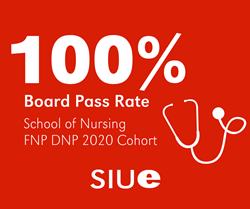
All 29 students in the SIUE School of Nursing Family Nurse Practitioner Doctor of Nursing Practice 2020 cohort reported a first-time pass rate on the two exams they are eligible to complete.
“This type of performance is one of the many reasons why our program is so attractive to prospective students and to employers who seek our graduates.”
EDWARDSVILLE, Ill. (PRWEB)
September 15, 2020
Excellence has been achieved by the Southern Illinois University Edwardsville School of Nursing (SON) Family Nurse Practitioner (FNP) Doctor of Nursing Practice (DNP) 2020 cohort. All 29 students reported a first-time pass rate on the two exams they are eligible to complete. That 100% achievement surpasses the approximately 86% national average for both exams, based on 2019 data.
According to the SON’s Valerie Griffin, DNP, PPCNP-BC, FNP-BC, PMHS, FAANP, clinical associate professor and director of nurse practitioner specializations, 15 students took the American Academy of Nurse Practitioners National Certification Board (AANPCB) exam and 13 took the American Nurses Credentialing Center (ANCC) exam. One student completed both exams, achieving a first-time pass on both.
“Our FNP specialization program provides students with a robust and contemporary, evidence-based curriculum that superbly prepares them for certification and practice as an advanced practice nurse,” said SON Dean Laura Bernaix, PhD, RN. “I am not surprised to see this perfect pass rate as I know that our FNP faculty work extremely hard, as do the students, to achieve these types of results year after year. This type of performance is one of the many reasons why our program is so attractive to prospective students and to employers who seek our graduates.”
A worthy accomplishment any year, the 100% first-time pass rate is a remarkable feat in 2020 given the ongoing COVID-19 pandemic and the public health crisis’ impact on developing and practicing nurses. One of the biggest COVID-19 challenges faced by nurse practitioner programs across the nation in March was that students were not allowed to complete their clinical practicums.
“Clinical agencies were unsure how to continue offering healthcare to their patients, and most made the decision to discontinue graduate clinical practicum experiences while they worked through their own concerns,” explained Griffin. “Our certifying bodies, the AANPCB and the ANCC, require a minimum of 500 clinical practicum hours to be eligible to sit for those exams. At SIUE, we require 690 clinical practicum hours.”
While some universities were unable to overcome and help their students fulfill those requirements, the SON’s dynamic team exhibited extreme flexibility and persistence as they pursued alternative arrangements in support of their students.
“In March when the pandemic was declared, I immediately reviewed our student clinical hours in our documentation system and was relieved to find that all 29 students had already completed a minimum of 500 hours,” Griffin recalled. “That was a relief. We were able to complete the remaining seat time with other types of clinical activities, and all 29 students were able to graduate in May.”
“I was extremely proud of the way our students handled the stress of the pandemic,” she continued. “They had spent 3-4 years in this rigorous program and were just weeks from completion. The students remained calm and waited for our guidance on how they would complete those final requirements, including clinical hours, doctor of nurse practitioner project dissemination, immersion, and finally the certification exam. We want our students to be safe, effective and compassionate nurse practitioners, and our faculty modeled that behavior in their interactions with our students during these difficult times.”
The SIUE School of Nursing’s programs are committed to creating excellence in nursing leadership through innovative teaching, evidence-based practice, quality research, patient advocacy and community service. Enrolling more than 1,700 students in its baccalaureate, master’s and doctoral programs, the School develops leaders in pursuit of shaping the nursing profession and impacting the health care environment. SIUE’s undergraduate nursing programs on the Edwardsville campus and the regional campus in Carbondale help to solve the region’s shortage of baccalaureate-prepared nurses and enhance the quality of nursing practice within all patient service venues. The School’s graduate programs prepare nurses for advanced roles in clinical practice, administration and education.
Share article on social media or email:

